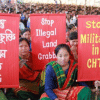Protect the rights of ordinary Bawm people

We urge the government to take the allegations brought forth by Amnesty International regarding a crackdown on the Bawm community seriously. The human rights watchdog has alleged that since April 7, over 100 Indigenous Bawm people have been arrested in the Chittagong Hill Tracts (CHT) following multiple attacks on banks and security facilities between April 2-3. While these attacks must be investigated and their perpetrators brought to book, security forces should not carry out blanket arrests of Bawm people without legitimate cause.
Not only are such arrests counterproductive in holding the actual perpetrators to account, but they might also lead to further distancing between the Indigenous population and law enforcement agencies as well as human rights violations, giving rise to more tension and the possibility of future violence. Law enforcers can, of course, arrest individuals on specific charges. However, when conducting such operations, security personnel must also be mindful of protecting ordinary citizens.
Aside from the arrests, Amnesty has also alleged that security forces have been restricting how much rice each Bawm person is allowed to carry from groceries—possibly to prevent Kuki-Chin National Front, said to be responsible for those attacks, from stocking up on food. And here again, we must advice caution on part of the security forces to not overstep acceptable boundaries that may lead to the harassment of the Bawm people or make their life and livelihood difficult.
The prevailing situation in the CHT, as we understand it, is quite sensitive. In the face of various challenges, security personnel have their work cut out for them. But it is precisely because of the sensitive nature of this situation that security operations in the region should be conducted keeping in mind that the rights and security of citizens—especially those belonging to minority communities—are not violated in any way. Ultimately, peace in the CHT is dependent on the proper implementation of all the clauses of the CHT Peace Accord.
And that is the direction we should be headed for, not greater securitisation or marginalisation of local communities.


 For all latest news, follow The Daily Star's Google News channel.
For all latest news, follow The Daily Star's Google News channel. 










Comments